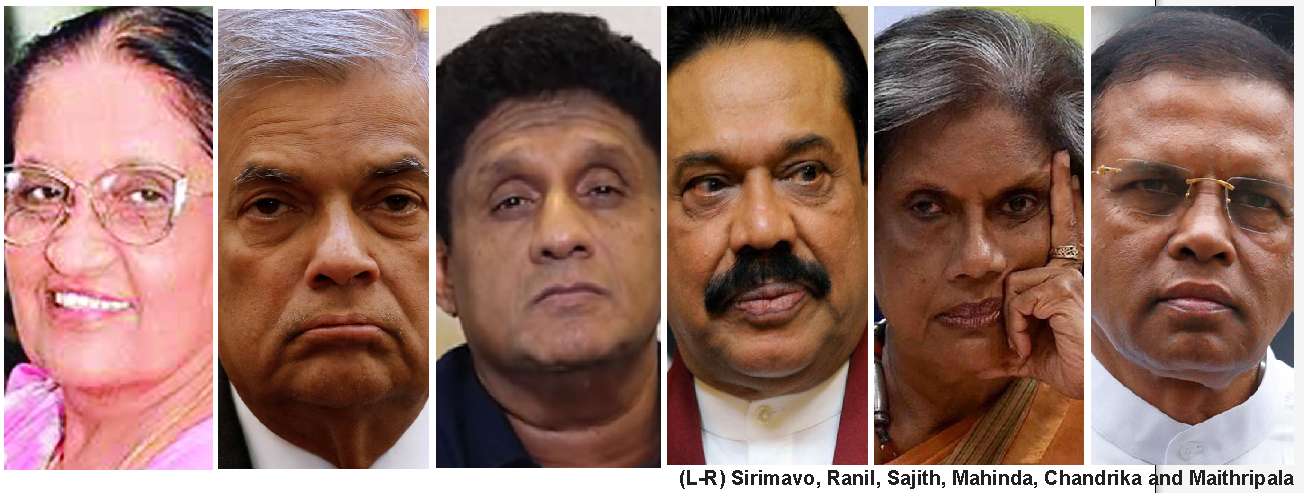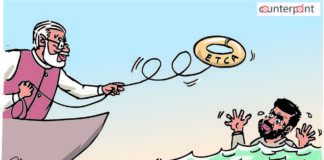- W. R. D. Bandaranaike and his wife Sirimavo would turn in their graves if they knew the sorry state of affairs in their beloved party, whose MPs and office-bearers cannot unite at least to commemorate them.
On December 31, 2022, the dissident SLFP MPs (elected on the SLPP ticket) held a separate religious ceremony at Kirivehera, Kataragama to ring in the New Year. Former President Mahinda Rajapaksa and several other SLPP MPs attended it. Minister Mahinda Amaraweera said Sirimavo had started the annual event 60 years back, and it had since been held continuously. Saturday’s ceremony was preceded by a religious function held under the aegis of SLFP Chairman and former President Maithripala Sirisena, at the party headquarters, without the participation of the dissident group.
‘Bid to assassinate Sirimavo’
The Sirisena faction of the SLFP was prompt to condemn the dissident MPs for holding a separate religious function on December 31. Senior Vice President of the SLFP Prof. Rohana Lakshman Piyadasa did not mince his words when he said that if Sirimavo had been alive, she would have considered the Kataragama event as an attempt to assassinate her, for even those who had sought to destroy the SLFP had been invited to it. His remark has incensed the SLFP dissidents beyond measure.
The dissident MPs claim that they are still members of the party, but they will have to come to terms with reality if the Election Commission (EC) in case the Local Government elections are held. They will not be able to obtain nominations from the SLFP for their supporters; in such an eventuality, they will have to form an independent group to contest the elections or close ranks with either the SLPP or the UNP or the alliance the two parties are expected to form.
Larger crisis
The SLFP’s problems cannot be discussed in isolation from those which the Sri Lankan political system is beset with. It is only part of a much larger crisis that has developed over the years, and had a corrosive effect on political stability.
The SLFP’s internal problems represent in microcosm the crisis of Sri Lanka’s political party system. None of the existing political parties are free from crippling internal disputes. The debilitation of political parties could have a deleterious effect on democracy. As the frame of bones or skeleton is to a human or animal body, so is the political party system to a democracy. What ails the party system in Sri Lanka could be considered the political version of osteoporosis, in a manner of speaking.
Sri Lanka’s political party system has been in a perpetual state of flux during the past several decades. This process of continuous change has led to the disintegration, realignment and integration of political parties and forces, the disappearance of traditional binaries associated with democratic politics, and the emergence of a host of ideological choices for the public.
Splits and breakaways affecting political parties are not of recent origin, in this country. The Lanka Sama Samaja Party (LSSP), founded in 1935, suffered more than 10 splits within the first 50 years, and its breakaway groups emerged as new political parties such as the Sri Lanka Communist Party (CPSL) and the Mahajana Eksath Peramuna (MEP) and the Nava Sama Samaja Party (NSSP). All of them, however, have become dependent on the main political parties that represent centre-left politics to secure parliamentary representation or remain relevant in national politics.
The SLFP emerged as an offshoot of the UNP in 1951 and established itself. It was the first split the UNP suffered after its formation in 1946.
But the changes that Sri Lanka’s political party system underwent in the past were not as intense as they are today, when splits have become the order of the day and had a crippling effect on all parent parties. The Sri Lanka Podujana Peramuna (SLPP), founded in 2016, has already suffered three splits in spite of its meteoric rise in politics, having won three elections—local government, presidential and parliamentary—in a row. It is now wary of facing elections!
Post-1977 era
Parliamentary polls held on July 21, 1977 to elect the second National Assembly or the eighth parliament of Sri Lanka marked a turning point in Sri Lanka politics. The UNP’s mammoth victory upended the country’s economy, political culture and the political party system. The existing Constitution, promulgated in 1978, brought about the executive presidency, and the Proportional Representation system. The UNP made the most of its five-sixths majority in the parliament to further its interests at the expense of other political parties and even democracy.
The SLFP, which was reduced to a mere eight seats, became faction ridden, and the imposition of civic disabilities on its leader Sirimavo, aggravated its woes. Two factions emerged in the party with one supporting Sirimavo and the other Anura, and they vied for dominance and fought internecine battles.
The SLFP’s internal battles came to a head when the country’s first presidential election was held in 1982 under the New Constitution. Sirimavo could not contest it owing to her civic disabilities, and the SLFP fielded Hector Kobbekaduwa against President J. R. Jayewardene, who did not leave anything to chance in his efforts to win the election, which was marred by large-scale rigging and widespread violence. Following Kobbekaduwa’s defeat, the Anura faction turned hostile towards the Sirimavo loyalists, especially Chandrika and her husband Vijaya Kumaratunga, who became very popular among the SLFPers. A group led by Vijaya and Chandrika left the SLFP and formed the Sri Lanka Mahajana Party (SLMP) in 1984.
The formation of the SLFP in 1951 saw the coming together of two prominent political families—the Bandaranaikes and the Rajapaksas. They found themselves at loggerheads later so much so that Chandrika went to the extent of trying to engineer SLFP presidential candidate Mahinda Rajapaksa’s defeat in 2004. She failed in her endeavor.
Ironically, both the Rajapaksas and the Bandaranaikes have lost control of the SLFP, but Chandrika has not given up the fight; she is trying her best to oust Sirisena and grab the party leadership. But she has her work cut out, given the fact that she lacks political clout, and the dissident SLFP MPs have chosen to throw in their lot with the SLPP-UNP government. Former President Sirisena now stands accused of trying to form a new political dynasty!
President Jayewardene controlled the UNP with an iron fist, having obtained undated resignation letters from all members of his parliamentary group. He served two terms despite the JVP’s terror campaign to oust his government in the late 1980s. His successor, President Ranasinghe Premadasa also held the party together initially, but his anti-elitist outlook and style of politicking antagonized some prominent UNPers who also had presidential ambitions. In 1991, a group of dissident UNP MPs sought to impeach him but in vain. Premadasa sacked the dissidents including Lalith Athulathmudali and Gamini Dissanayake, and they formed the Democratic United National Front (DUNF), which became phenomenally popular and strong within weeks of its formation, and boosted the morale of the Opposition, which took on the UNP government with renewed vigor. It was the major split the UNP suffered after the breakaway of Bandaranaike in 1951. The dissidents returned to the UNP’s fold following the assassinations of Athulathmudali and President Premadasa in quick succession in 1993. The UNP has been anything but united ever since under current President Ranil Wickremesinghe’s leadership. The next major split in the UNP occurred prior to the 2020 general election with a group of its senior members led by Sajith Premadasa breaking away to form the Samagi Jana Balavegaya (SJB), which obtained 54 seats as opposed to the UNP’s single National List seat.
The JVP has also not been free from splits. A large number of its seniors left it after its abortive uprisings in 1971 and in the late 1980s, but it suffered its worst breakaway in 2008 with a group led by its Propaganda Secretary and MP Wimal Weerawansa closing ranks with the Mahinda Rajapaksa government and forming the National Freedom Front (NFF). The JVP suffered another split in 2012, when a group of its influential members broke away and formed the Frontline Socialist Party (FSP) under Kumar Gunaratnam’s leadership. An attempt to forge an alliance between the JVP and the FSP, following the Aragalaya protest campaign, did not succeed.
Splits have debilitated the Tamil United Liberation Front (TULF) as well. Its problems began with the formation of the Tamil National Alliance in 2001 to contest parliamentary polls. But a dispute between two groups, one supporting the LTTE and the other opposing it, led to a split in the TULF and the revival of the Illankai Tamil Arasu Kachchi (ITAK).
The Sri Lanka Muslim Congress (SLMC) has also failed to remain united. A dispute between its leader Rauff Hakeem and a group of dissidents led by Rishad Bathiudeen over the latter’s decision to support the SLFP-led United People’s Freedom Alliance (UPFA) government in 2004 led to a breakaway of the rebel MPs, who formed the All Ceylon Makkal Congress, which has parliamentary representation today under Bathiudeen’s leadership.
Causes of splits
Splits in political parties are generally thought to be due to ideological factors, but in this country, they result from personal rivalries, personality clashes and competing interests of ambitious politicians more than ideological differences. The SLFP is in the current predicament due to clashes between Chandrika and Mahinda, and differences between the Rajapaksa family and Sirisena, who decamped in 2015 to achieve his presidential dream, and thwarted the party’s attempt to win the general election because he did not want Mahinda to become the Prime Minister. Clashes between Sirisena and the Rajapaksas led to the latter leaving the SLFP to form the SLPP. It was personal rivalries between the Rajapaksa family and some prominent dissidents such as Wimal Weerawansa, Dullas Alahapperuma and Anura Priyadarshana Yapa that caused trouble for the SLPP. If not for clashes between Wickremesinghe and Sajith Premadasa, the UNP would have remained united.
No Sri Lankan political leader has put his or her party, much less the country, before self, during the past couple of decades, and the resultant debilitation the political party system has caused a severe erosion of public faith in electoral politics and given a boot to anti-politics, which drives the youth to resort to extra-parliamentary methods to bring about regime changes.



 Logging you in...
Logging you in... Loading IntenseDebate Comments...
Loading IntenseDebate Comments...

